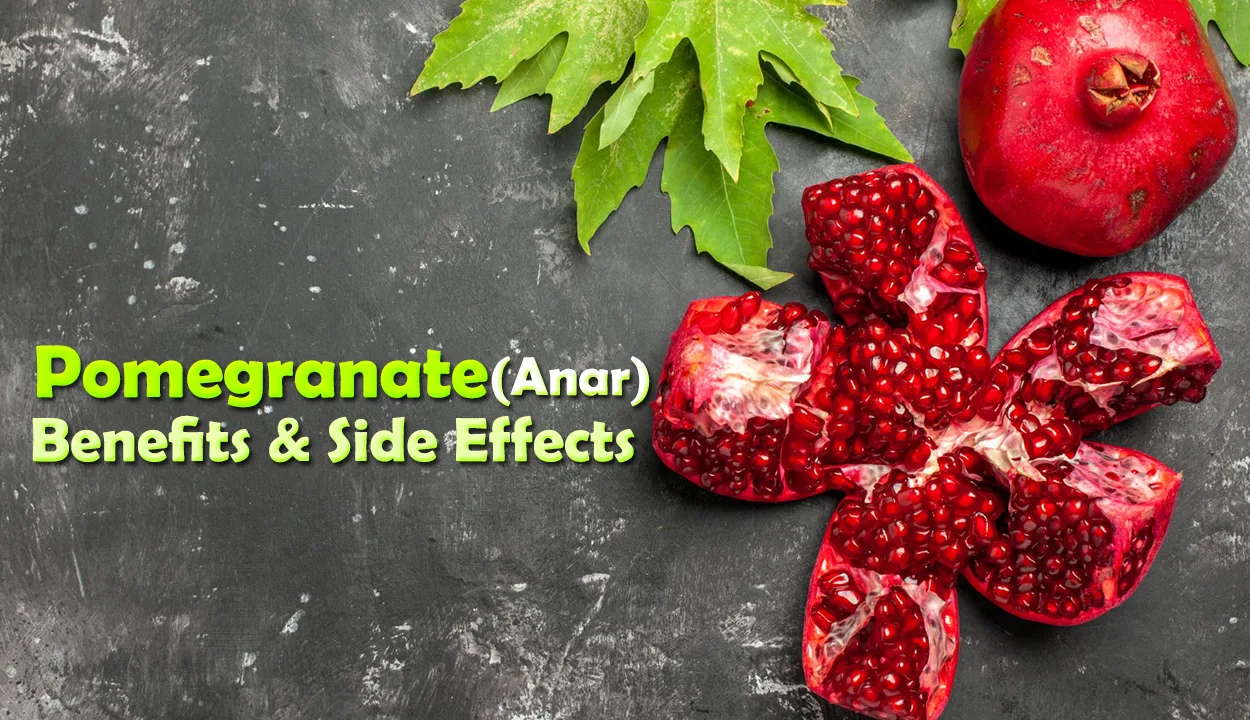
Pomegranate is a shrub or small tree 8 to 13 feet high with multiple tiny branches. Pomegranate leaves are sub-opposite, narrow, oblong, and glossy. The flowers are red with 3–7 petals. Some fruitless varieties are grown with patels. The pomegranate’s name comes from the Latin words “pomum “and “granatum,” which mean apple and many seeds. If we talk about cultivation, its biggest exporter is Iran. Also, the Middle East and Mediterranean regions produce pomegranate fruit. And it has a very short time mostly from October to February, to enjoy this limitless fruit benefits.
Table of Contents
If we talk about its color and shape, then:
Its shape is round, and its color is bright red. The exterior texture is rough, and the inner side contains small, tinny, pulpy seeds full of sweetness and sourness. And yes, it has a solid color-staining fruit, so be careful while you peel this tangled fruit. It has many nutrition and benefits in itself.
Varieties of pomegranate (Anar):
In America, grocery stores have a typical variety of pomegranates called wonderful. But elsewhere in the world, there are many varieties with different colored skin and sizes.
Pomegranate Nutrition Facts:
This fruit has rich nutrition like potassium, fiber, and antioxidants, and the most precious vitamin is vitamin C. This fruit is love.
How much protein, carbs, and calories does pomegranate have? Take a look
This fruit has calories, carbs, and proteins, which are very healthy for men, women, and kids.
- Calories contain (234)
- Protein (4.7)grams
- Fat (3.3)g
- Carbohydrates (52)g.
- Sodium (8.4)mg
- Fiber (11.3)g
- Sugar (38.6)g
So overall, this versatile fruit provides important vitamins and minerals, which we have already mentioned above.
How do we use pomegranate (Anar) in our daily routine?
Pomegranate can be eaten daily because it’s a divine fruit. In many forms, it can be used; its pulpy seeds can be eaten. we can use pomegranate to make juices pomegranate margaritas, and pomegranate tea. In salad, it can be used. Sprinkle pomegranate seeds on yogurt. You can make a smoothie by adding other fruits. Pomegranate molasses is a syrup certainly used in Eastern Europe as a replacement for vinegar, used in fish meat and chicken.
Scientific benefits of pomegranate:
Pomegranates contain more antioxidants, up to three times more than green tea. Its antioxidant, called ellagitannins, helps to reduce inflammation in the body.
- Ellagitannins help protect the brain from Alzheimer’s and Parkinson’s disease.
- Pomegranate helps lower blood pressure as well as blood sugar levels.
- Pomegranate juice may help reduce LDL cholesterol, or bad cholesterol, which clogs arteries.
- Its juice improves diabetes control through an improvement in insulin resistance.
- It also helps with weight loss.
In some early studies, it showed potential help for prostate, breast, lung, and colon cancer.
More research is needed to better understand these effects on humans.
Side effects of pomegranate (Anar)
Pomegranate also has some side effects on the human body in some people. Pomegranate extract can cause side effects and allergic reactions.
- Redness
- Itchy skin
- Welts
- Inflammation
These side effects occur when essential oils are not diluted with carrier oils.
Pomegranate benefits related to skin:
Pomegranate use helps to improve skin health, reduce wrinkles, and prevent sun damage. This delish fruit has itself skin glowing and brightening treatment.
- The use of pomegranate detoxifies the skin.
- Reduce the chances of acne.
- Promotes collagen production to reduce fine lines.
- The owner of antioxidant and anti-ageing properties.
- Pomegranate oils are vital as serum. Can use after toning and cleansing.
- The essential oils in pomegranate are more potent than the extracts.
Pomegranate as a supplement:
Yes, you heard about supplements. If you are not willing to apply oil tropically to oxidize your skin, then you can use supplements made with pomegranate extract and add them to your daily routine. An antioxidant helps to neutralize the effects of free radicals in your body.
Pomegranate is used in an Islamic way.
This fruit is also from paradise (Jannah), and it has vital effects and 3 times mentioned in the Holy book (Quran) in Surah AL-ANAAM chapter 6 verses 99 and 141 and Surah AL-Rahman chapter 55, verse 68. It has a beautiful structure with a Gem-like beauty resemblance to Honeycomb. Each of them is a sign of our sustainer. pomegranate is also mentioned in the Bible.
The last messenger of Allah (SWT) states in a holy saying: Whoever eats a Pomegranate ALLAH will light his heart forty nights.
The bottom line:
Scientifically and in the Holy Book, it was proved that pomegranate has many beneficial effects and facts on the human body it keeps you healthy and happy and gives you a light soul. Stay happy stay healthy enjoy the nature fruits.
Always remember that good health keeps you happy and free of sadness.
